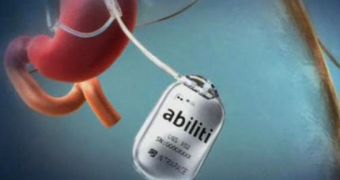Mountain View, California-based company Intrapace has begun selling a new type of medical implant throughout Europe, one which officials at the corporation herald as a viable alternative to stomach bypass surgery and stapling for people who are morbidly obese.
The tool could provide the same benefit, but without the need to remove portions of the stomach, and piecing the rest together. Company representatives say that the device works by creating a sensation of fullness prematurely.
The way this is done is by stimulating a series of nerves that can be found curling around the stomach. This literally makes the patients feel as if they had enough to eat, and reduces the risk of binge eating.
Abiliti – the name Intrapace gave to its device – is also capable of sensing when a person begins to eat, and turns on automatically. The sensations it generates are highly-realistic, its developers say.
At this point, the implant is available in Germany, Spain, and the United Kingdom, and the first implantations have already been scheduled for later this wee. Clinical trials the company carried out thus far were conducted on 65 people.
On average, the participants lost about 22 percent of their body weight within 12 months. In some of the best cases, the weight loss reached 38 percent of the original body mass. Intrapace is scheduled to publish full details of the results soon, Technology Review reports.
In addition to acting directly on the stomach, the implant is also capable of informing physicians as to how much exercise a patient is getting. This can be done due to the fact that Abiliti features an in-built accelerometer, of the type that switches the image from portrait to landscape mode in cell phones.
The implant can be placed inside the body via a minimally-invasive type of laparoscopic surgery. Doctors insert it in the abdominal cavity, but outside of the stomach. The device is the size of a pacemaker, the instruments used to regulate heart rhythms.
According to the president and CEO of Intrapace, Chuck Brynelsen, sensors and electrodes in the Abiliti device detect when food starts entering the stomach, and send electrical signals through the stretch receptor nerves, which then relay the information via the vague nerve to the brain.
This creates an artificial sensation of fullness that is triggered prematurely, before the stomach is filled up entirely. “What's unique about the Abiliti device, and what attracted me to it, is that it's got the capacity for intelligent sensing,” explains Abeezar Sarela.
He holds an appointment as a bariatric surgeon at the University of Leeds School of Medicine, in the United Kingdom, and is so enthusiastic about the device that he wants to start offering it to his patients.
However, given that the device and associated operation will cost about $21,000 to purchase and have installed, it's highly unlikely that it will replace stomach bands and gastric bypass surgeries any time soon.

 14 DAY TRIAL //
14 DAY TRIAL //